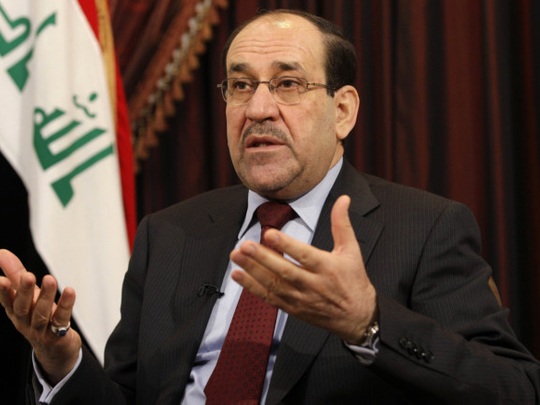
News from Iraq has once again become the leading topic in newspapers and is also taking up a lot of airtime on various TV channels.
There are differing analyses about the causes and expected results on the local and regional levels and their role in starting a new Cold War after Vladimir Putin, the Russian President, stepped in and expressed Russia’s support for Iraqi Prime Minister Nouri Al Maliki. However, none of the expectations and analyses leave room for optimism regarding the future of the country.
All expected solutions are difficult to implement. But, the least harmful is related to the political process: Leaders must back off from their radical attitude and form a transitional government for national salvation, which should be civilian in nature and made up of technocrats.
The latest issue of Time magazine carried an image of Iraq’s map with fire raging along its western borders, with the words: ‘The End of Iraq’.
True, the division of the country is a possible scenario. But, it is not the only one. Moreover, it is highly unlikely that Iraq, after June 10 — when members of the Islamic State of Iraq and the Levant (Isil) overran Mosul — will ever be the same again.
The truth is that what is happening in Iraq is an inevitable result of events that go back several decades and are a direct consequence of dictatorship and the lack of vision and sentiments of affiliation to Iraq. The country has lost out because of this and its effects are being reflected in Iraq’s internal and regional status.
If these events have surprised those governing Iraq and some neighbouring countries — which is unlikely — they most certainly did not surprise the US. For, despite the fact that American forces withdrew from Iraq in December 2011, Washington’s presence cannot be ignored because it closely monitors everything that is taking place in the country. America’s reaction reflected the fact that it was not surprised. This was also evident in US President Barack Obama’s speech where he stated that the US would not intervene militarily unless there was a political process in Iraq that ensured no one would be marginalised. The truth is that the US president’s speech was directed primarily at Al Maliki. But it remains a fact that the speech also showed the spinelessness of Obama’s foreign policy.
It has been nearly a century since the Sykes-Picot agreement redrew the geography of the region. That deal did not take into account the demographic, ethnic and sectarian realities of the region. However, that did not prevent the coexistence between the people of these countries and the emergence of social and family connections, which preserved civil peace.
In this context, it may be beneficial to discuss “unification and fragmentation” and the circumstances that led to “fragmentation” overshadowing unity. This process facilitated the transformation from a religious and cultural mosaic to car bombs that explode everywhere. There are reasons for the change in the general climate in these communities, most notably the decline of the political role of forces that took up ambitious projects.
The notion of unity that accompanied the establishment of these countries and promoted pan-Arab and leftist ideologies has declined. The Sykes-Picot agreement gained international legitimacy when the countries that emerged as a result of the accord became members of international organisations. So are we about to witness the tearing up of this agreement through international resolutions?
Partitioning Iraq is not an easy solution to resort to, without studying the repercussions and consequences, especially since a country like Iraq is not easy to separate geographically.
So who decides that Iraqis are no longer able to continue to live with each other? The most important sectarian warlords, militia leaders or corrupt political elites? Or is it Iraq’s neighbouring countries? Or will that decision be taken by the Iraqi citizens at a time of peace, not overshadowed by the atmosphere of corruption, murder and destruction?
Dr Mohammad Akef Jamal is an Iraqi writer based in Dubai.







